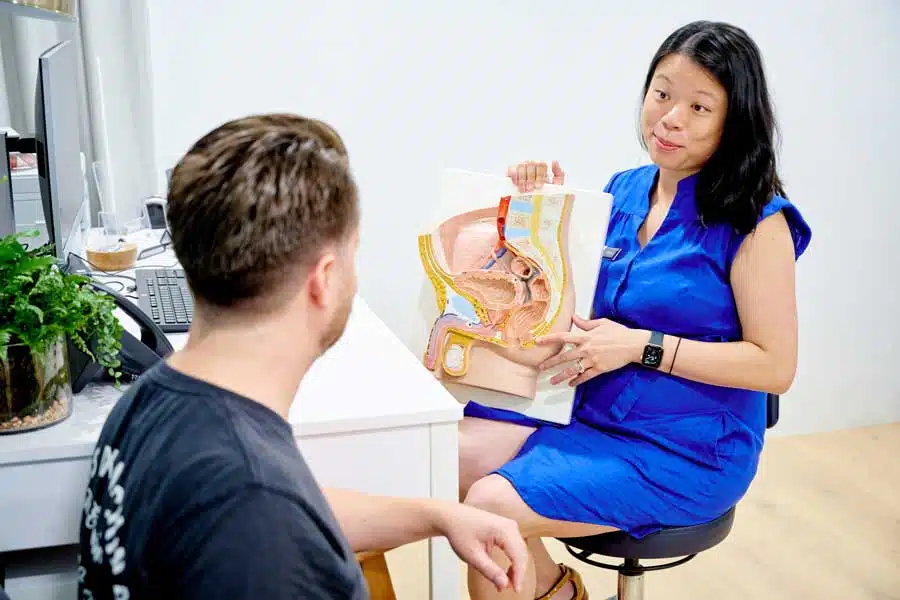Hard Flaccid Syndrome
What is Hard Flaccid Syndrome?
Hard flaccid is a NEW term, created by patients not clinicians, based on one or a combination of the following symptoms:
- Shortening or retraction of the penis in the flaccid state
- Sensation or temperature changes in the penis such as numbness or coolness
- Texture changes – described as “rubbery” rather than “spongey”
- Pain in the penis or perineum
- Painful ejaculation
Hard flaccid is thought to be caused by a range of factors, including injury to the penis, failed penis enhancements, and generally high stress levels.
Hard flaccid can be strongly linked to pelvic floor muscle tension as well as anxiety. At SPC we will look at the big picture and figure out what aspects of your lifestyle could be contributing to your symptoms, as well as give you practical strategies to alleviate tension.
What is Involved in Diagnosing Hard Flaccid Syndrome?
Assessment of this condition revolves around both the collection of your medical history to check for risk factors such as UTIs/history of trauma, etc., and assessment of the pelvic floor muscles. This will be done using a range of techniques that may include perineal palpation, transperineal ultrasound and/or digital rectal examination. All assessment options will be provided to you so you can make an informed decision on what is best for you.
What is the Treatment for Hard Flaccid Syndrome?
Most commonly, in-clinic treatments here at Sydney Pelvic Clinic involve a range of exercises that may include pelvic floor muscle downregulation, as well as pelvic yoga, and/or physical restore workshops. We’re also experienced in the use of Focused Shockwave Therapy for the treatment of Hard Flaccid Syndrome. During this treatment, different areas of the penis and perineum will be targeted with a hand-held device that emits low intensity sound waves to improve blood flow to these areas. Focused Shockwave Therapy is designed to be as painless for patients as possible, these pulses work to stimulate muscle relaxation, improved blood flow and ultimately healthier erections. Your physiotherapist will assess whether this treatment is appropriate for you.
Are There Any Home-based Treatment Options?
Many of the exercises that you work on with your physiotherapist can and should also be practiced at home. Regular pelvic floor relaxation and stretching exercises should especially be implemented between appointments, though make sure to discuss frequency, etc. with your physiotherapist to ensure safe practice at all times as overdoing things can also worsen symptoms in some cases.
3 Tips to Prevent and Manage Hard Flaccid Syndrome
-
-
- Stress reduces erectile function and creates muscle tension, so think about how you’re handling stress
- Try relaxing your pelvic floor throughout the day
- Consider cardiovascular exercises including walking, yoga, tai chi, and swimming
-
Common Myths About Hard Flaccid Syndrome
Myth #1: I need to do more kegels (pelvic floor exercises).
Truth: Kegels are often recommended during treatment for Hard Flaccid Syndrome, but overdoing things can exacerbate the condition. Your physiotherapist will advise you on whether or not kegels would be beneficial for your unique treatment plan.
Myth #2: I’m going to be stuck with this forever.
Truth: Regardless of how long you’ve experienced Hard Flaccid Syndrome, effective treatment is possible with the right management plan.
Myth #3: My prostate is the cause of my Hard Flaccid Syndrome.
Truth: The majority of men with Hard Flaccid Syndrome have entirely normal prostate readings.
Get Treatment for Hard Flaccid Syndrome
Hard Flaccid Syndrome can be a difficult condition to live with, but our physiotherapists are on hand to help. Simply book an initial consultation today to get started.
